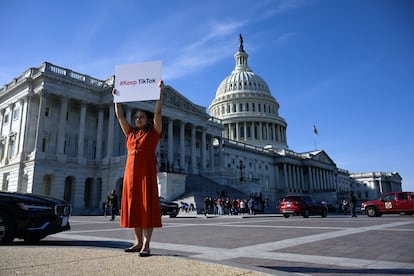Is the US really going to ban TikTok?
A new law aims to force ByteDance, the Chinese company that owns the platform, to sell the app under the threat of closure. It is a step with precedents in other countries that opens up multiple concerns and scenarios

The United States has sent a message to TikTok: either sell the company or shut down. The threat is now official. ByteDance, TikTok’s Chinese parent company, has nine months to decide what to do. Here are the main questions about what could happen.
1. Is it a complete ban?
Not necessarily. ByteDance could sell the app to a U.S. company and everything would remain more or less the same; although it’s somewhat unlikely because it’s not the preferred choice of TikTok, which says the new law is in fact a ban and wants to take the matter before a judge: “This unconstitutional law is a ban on TikTok, and we will challenge it in court,” the company said in a statement. If that happens, the Supreme Court will have to decide whether the law violates the freedom of expression of the platform and its users, a very sensitive issue in the U.S.
A court process could also lengthen the initial nine-month deadline. As such, not much more is likely to happen this year. In November there is a presidential election and Donald Trump, who attempted to ban TikTok in 2020, is now more benevolent. There may yet be changes.
2. I am European or Latin American, does this apply to me?
If you don’t live in the United States, you will not be affected directly. But a TikTok without the 170 million users the platform claims to have in the U.S. would be just another network. Not only because of the videos they create, but also due to the trends or challenges that emerge from the network’s core market. It is possible some large content generators will move to Canada or Mexico, but they are unlikely to go to too much trouble if their primary market, TikTok users in the U.S., has vanished.
3. Surely there will be some trick to keep using TikTok in the U.S.?
No. Apple and Google will be obliged to remove the app from their stores. There will be no more updates. Internet providers will also limit access. Although using a VPN is a common trick to access the internet as if you were in another country, with app stores it requires a major effort and is unaffordable for most users.
4. Who stands to gain from the potential ban?
In a word: Zuckerberg. If any network resembles TikTok today, it’s Instagram and its Reels. They are, in fact, a copy. For many TikTok influencers, replicating their success will not be easy on Reels, but there are few alternatives. Reels is growing steadily and already accounts for 50% of the time Instagram users spend on the app. That’s an impressive increase for a platform that used to be all about photos. There is also YouTube Shorts - short videos - but the type of content there is even more different from TikTok than Reels, even if the same vertical video format is the basis of the three options.
5. The threat alone is already making us rethink our relationship with the app.
The lack of a clear alternative — and the fact that the threat is not immediate — will keep TikTok users on the platform as usual. But there will be one party — the content creators who stand to lose the most — who will have to divide their efforts between other platforms in case the ban comes into force.
6. Why is all this happening?
National security is the main reason cited. Supporters of the law say that on TikTok it is easier to find videos showing U.S. citizens hooked on fentanyl or Chinese cities gleaming at dusk than content concerning Chinese repression of Uyghurs or depicting the American dream. This kind of propaganda would not be grounds for shutting a platform down, but TikTok is a growing source of information for citizens in the West. Joe Biden’s presidential reelection campaign has a prominent account on TikTok.
If China were to resort to war over its claims on Taiwan, would Beijing pressure TikTok to promote or hide one type of video? Or to interfere in a hotly contested U.S. presidential election, such as November’s? There was a controversy earlier this year, which many members of the U.S. Congress took into account when voting for the law, over a rumor — it is not clear that it is supported by data — that more pro-Palestinian than pro-Israeli information was available on the platform after the beginning of the Gaza war. The New York Times even published a chart, which has been widely circulated, comparing thorny issues for China on Reels and TikTok.
The U.S. government has provided no evidence that TikTok manipulates its platform, although some members of Congress have implied that they have had access to interesting confidential material. China has been blocking U.S. companies in its own territory for years. Neither Google, Facebook or Instagram are available there. Just this week, without making a song and dance, Apple removed WhatsApp and Threads, two Meta apps, from its Chinese store. The reason? “Based on their national security concerns,” said the U.S. multinational.
In the last 24 hours, two of our leading media sources (NYT & WSJ) have produced research pieces with hard data on why the U.S. should ban TikTok.
— ₿ΞΞnThereDoneThat Capital 賢い (@BeenThereCap) April 24, 2024
Here is the NYT's killer chart. Tiktok systematically censors 80-99% of posts on certain viewpoints, relative to Instagram.
1/3 pic.twitter.com/mStDgMAplH
7. Is there no other solution?
There are always other solutions. The Chinese government has vetoed TikTok’s “secret sauce,” the famous algorithm that recognizes users’ tastes so well. Last Thursday, The Information reported that TikTok is considering selling the app, but without its algorithm: it would sell only the brand and the audience, which is the equivalent to buying Coca Cola without its formula.
TikTok launched the so-called Project Texas, together with Oracle, to ensure that U.S. users’ data stayed on servers in the country. But that hasn’t convinced anyone. If China wanted Americans’ data, there is an unregulated advertising market where they can pay to find what they want.
8. Is it as big a deal as it seems?
Yes and no. India had 200 million users on TikTok and shut down the app overnight. The reason was, in a more concrete case, also national security: the two countries were engaged in military skirmishes on their shared border. Since then, there are more Indians on Reels and many others who simply aren’t on any platform. In Afghanistan and Pakistan, TikTok is also banned. Many other countries prevent its download on the cell phones of civil servants.
9. Does it have anything to do with TikTok Lite in Europe?
Nothing. The European Commission has its own battle with the Chinese giant over TikTok Lite, which was launched in trials in Spain and France. The app rewards users who watch a lot of videos, or invite other users, with points. Brussels believes it may be addictive and dangerous for minors. They have asked TikTok to certify that they know what they are doing. So far, the company has not responded and negotiations are still ongoing. In the meantime, the platform has suspended the activity of the new app.
Sign up for our weekly newsletter to get more English-language news coverage from EL PAÍS USA Edition
Tu suscripción se está usando en otro dispositivo
¿Quieres añadir otro usuario a tu suscripción?
Si continúas leyendo en este dispositivo, no se podrá leer en el otro.
FlechaTu suscripción se está usando en otro dispositivo y solo puedes acceder a EL PAÍS desde un dispositivo a la vez.
Si quieres compartir tu cuenta, cambia tu suscripción a la modalidad Premium, así podrás añadir otro usuario. Cada uno accederá con su propia cuenta de email, lo que os permitirá personalizar vuestra experiencia en EL PAÍS.
¿Tienes una suscripción de empresa? Accede aquí para contratar más cuentas.
En el caso de no saber quién está usando tu cuenta, te recomendamos cambiar tu contraseña aquí.
Si decides continuar compartiendo tu cuenta, este mensaje se mostrará en tu dispositivo y en el de la otra persona que está usando tu cuenta de forma indefinida, afectando a tu experiencia de lectura. Puedes consultar aquí los términos y condiciones de la suscripción digital.









































